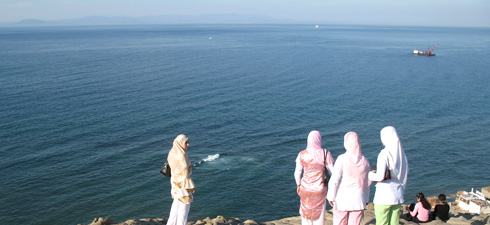Two years after the launch of the Union for the Mediterranean (UfM), Europe’s Mediterranean policy is slowly but surely bogging down. The grand projects announced in July 2008 seem to be drifting further and further out of reach: decontamination of the Mediterranean, development of sea highways to boost trade, civil protection initiatives to combat natural and man-made disasters, solar energy development, a Euro-Mediterranean university and Erasmus programme, and a Mediterranean Business Development Initiative for micro, small and medium-sized enterprises.
During its six-month stint at the helm of the EU, Spain was unable to get the process going again – or to prevent the collapse of theConference on Water in Barcelona (held on 13 April) or the postponement of the UfM plenary session. The failure to implement concrete projects isn’t the only source of disappointment – after all, one can always plead material difficulties. No, it’s that everything that is happening seems to suggest our hopes for the overall undertaking, the general idea of Mediterranean solidarity, were in vain. In a word, the enthusiasm has subsided.
Why? First and foremost, as always, the Palestine-Israel conflict, which generally paralyses everything and can stymie any specific action. It is a conflict with global implications, but in which Europe has little say or sway. And it is liable to hold Euro-Mediterranean relations hostage for some time to come.
“Every country has the politics of its geography”
The second reason is the lack of a serious EU project in the Mediterranean. It is now clear that the plans drawn up in Barcelona in 1995 for a free trade area (which was to materialise in 2010) were not a road map for solidarity-based development. Likewise, the objectives laid down by the UfM don’t amount to a real strategic change of course for Europe, they look more like a lesser evil after the Barcelona Process bogged down.
And now there’s a new roadblock: the global economic crisis and its effects on Europe. Europe is changing before our very eyes and the European project is on the rocks. The idea of a political Europe seems to be going up in smoke; in fact the euro crisis exposed the fragility of solidarity between European nations. The Union will now have to wait (three to five years) for its economic and financial future to clear up.
But the geopolitical dynamics, which more or less obey Napoleon’s theory that “every country has the politics of its geography”, are resurfacing with a vengeance. Germany is narrowing its sphere of overlapping interests with the rest of Europe, gazing eastwards instead, towards Russia, where its interests as a continental power are at stake. France, which bailed out Greece and Spain mainly for the sake of its own banks, but whose interests, properly understood, lie in strengthening ties to southern Europe, seem to have been struck dumb for the time being.
The last stumbling block is the situation of the countries on the southern and eastern Mediterranean shores. Turkey spent a long time knocking at Europe’s door, and Europe turned a deaf ear for a long time. Turkey now seems to be slowly but surely changing tack: it is steadily consolidating its regional power as an autonomous player in the Mediterranean and even in western Asia, knowing full well that will be the most effective way to get Europe’s attention.
Mediterranean would benefit enormously from Turkish accession to EU
Could the current crisis in the EU be an opportunity to the step up the Turkish accession process? No, not if Europe decides to regroup into concentric circles, with a nucleus of eurozone countries on the inside and all the other countries on the outside. Yes, if Europe itself, still in the throes of the euro crisis, finally chooses to set up a vast integrated free trade area of a highly original stamp. A sort of single market without a single currency, but with a common currency (this is not a distinction without a difference, as bankers know), like the one we had between 1993 and 1999 before the advent of the euro. Turkey would be eminently and solidly ensconced there, it would have its place.
On the other hand, there is no denying that the Mediterranean economy and regional political stability would benefit enormously from Turkish accession to the existing EU – that option needs to be pursued. But the situation that raises the hardest questions is that of the southern Mediterranean. It’s clear to everyone that, from here on in, Europe can’t be the driving force behind development in the Maghreb and Mashriq. It can help those countries integrate in the Mediterranean, where work and production are unequally shared out, but it can’t work miracles for their development. They have to take care of themselves. And the only way they can do that is to forge viable, coherent and cohesive regional ties.
Translated by Eric Rosencrantz
The Mediterranean
The North-South divide keeps growing
"Within the Union for the Mediterranean, the cultural divide between North and South is growing,” observes El País, citing the Euro-Mediterranean Intercultural Trends 2010 survey of 13,000 people in 13 of the 42 UfM nations carried out by the Anna Lindh Foundation. The report concludes that "the values on either shore are worlds apart”: the Muslim countries, first and foremost Morocco, prioritise "religion and the non-negotiable truth”, whereas in European countries, most strikingly in Spain and Sweden, "family is more important than faith" et "truth needs to be considered in the light of circumstances".
Was this article useful? If so we are delighted!
It is freely available because we believe that the right to free and independent information is essential for democracy. But this right is not guaranteed forever, and independence comes at a cost. We need your support in order to continue publishing independent, multilingual news for all Europeans.
Discover our subscription offers and their exclusive benefits and become a member of our community now!












